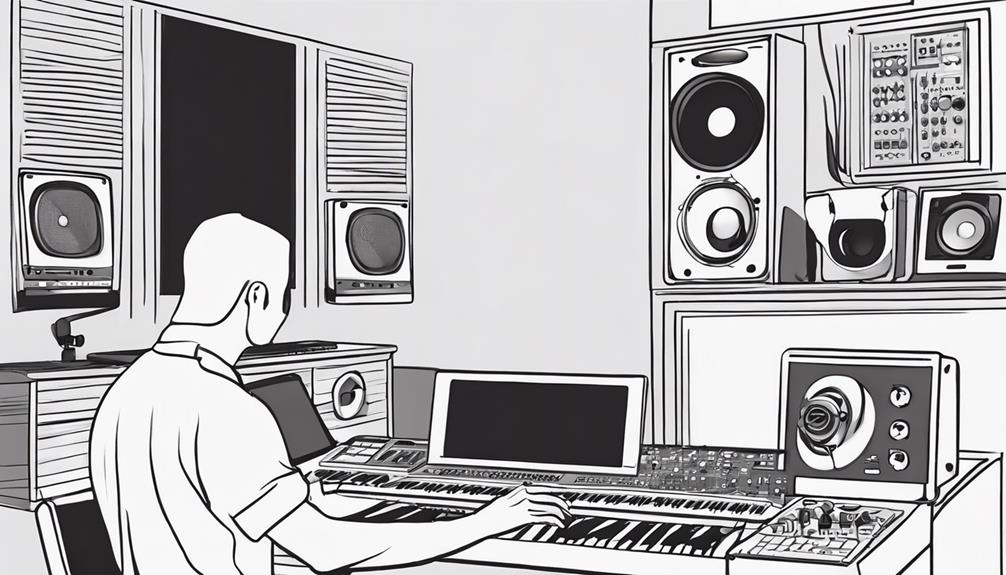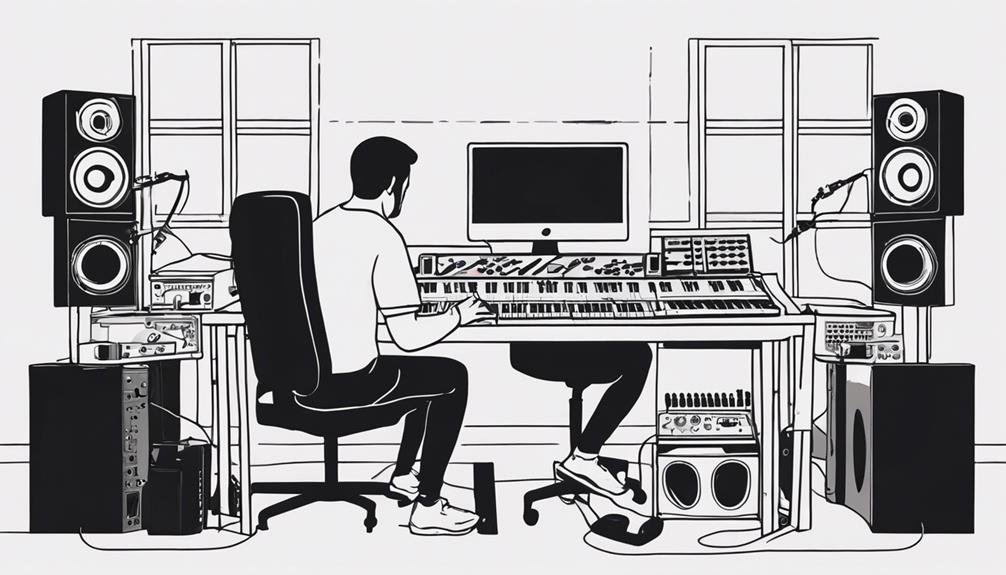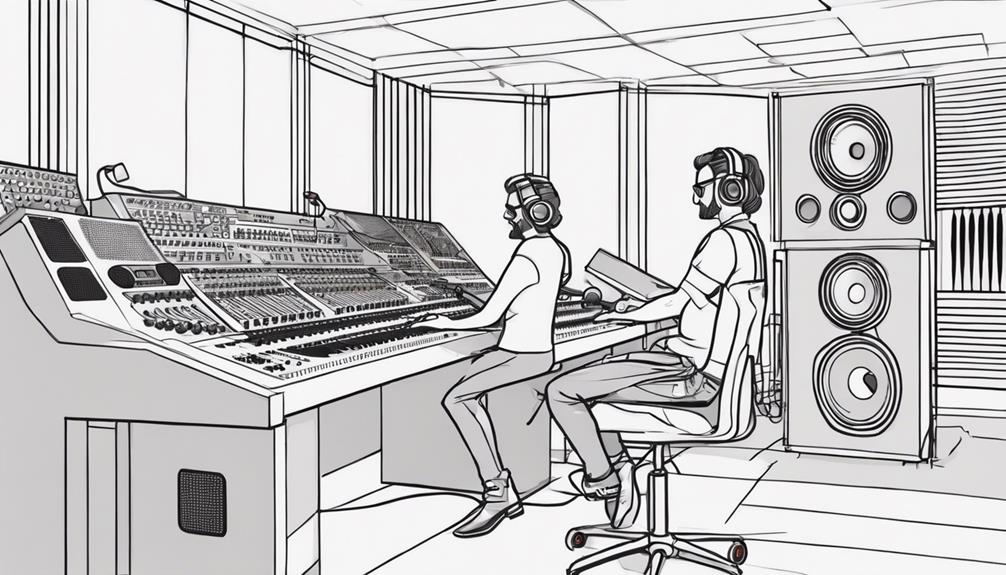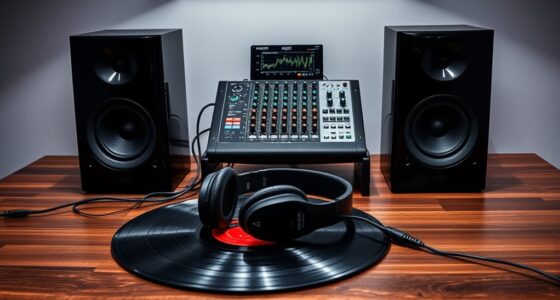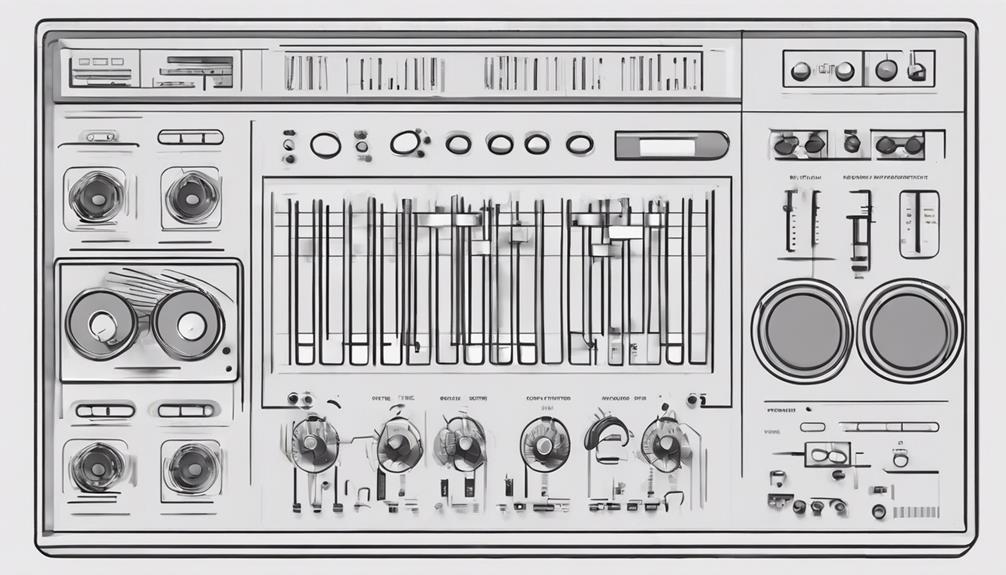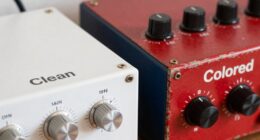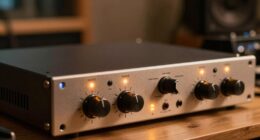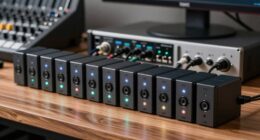To enhance your music production skills, start by mastering music theory basics and explore sound design techniques. Immerse yourself in your DAW and experiment with audio processing tools like EQ and compression for better mixing. Prioritize quality over speed to guarantee polished results. Stay creative by experimenting with new genres, instruments, and effects. Optimize your workflow efficiency with shortcuts and organized project files. Remember, these tips are just the beginning of your journey to becoming a skilled music producer!
Key Takeaways
- Master music theory basics: scales, chords, rhythm.
- Enhance DAW proficiency for efficient workflow.
- Prioritize quality over speed for polished results.
- Cultivate creativity through experimentation in genres.
- Stay updated on industry trends and software tools.
Develop Strong Music Production Foundations
To excel in music production, establish a solid foundation by mastering fundamental concepts and techniques. Learn music theory basics like scales, chords, and rhythm to deepen your understanding of music production. Understanding music theory will help you create harmonious compositions and melodies that resonate with your audience.
Additionally, explore sound design to craft unique textures and atmospheres that give your tracks a distinct flair.
As you work on your craft, study the production techniques of renowned producers to gain insights into arrangement, mixing, and sound design. Analyzing their methods will broaden your perspective and inspire you to experiment with different approaches in your own music.
Enhance Technical Skills and Knowledge
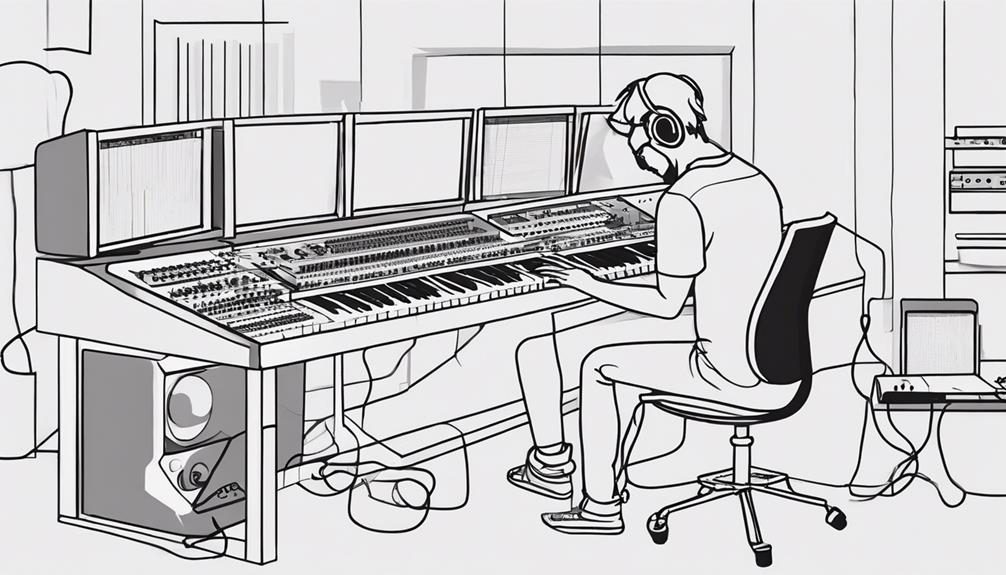
Improving your technical skills and knowledge in music production is vital for advancing your craft and creating high-quality tracks.
To excel in music production, Learn the ins and outs of your Digital Audio Workstation (DAW) to efficiently navigate its features, shortcuts, and functionalities.
Additionally, delving into music theory can enhance your compositions by understanding chord progressions, scales, and harmonies.
Experimenting with various audio processing techniques such as EQ, compression, and reverb can elevate the quality of your mixes.
Familiarize yourself with different plugins and software tools to expand your production capabilities and creativity.
It's essential to stay informed about industry trends, new technologies, and software updates to continually improve your technical skills in music production.
Prioritize Quality Over Speed
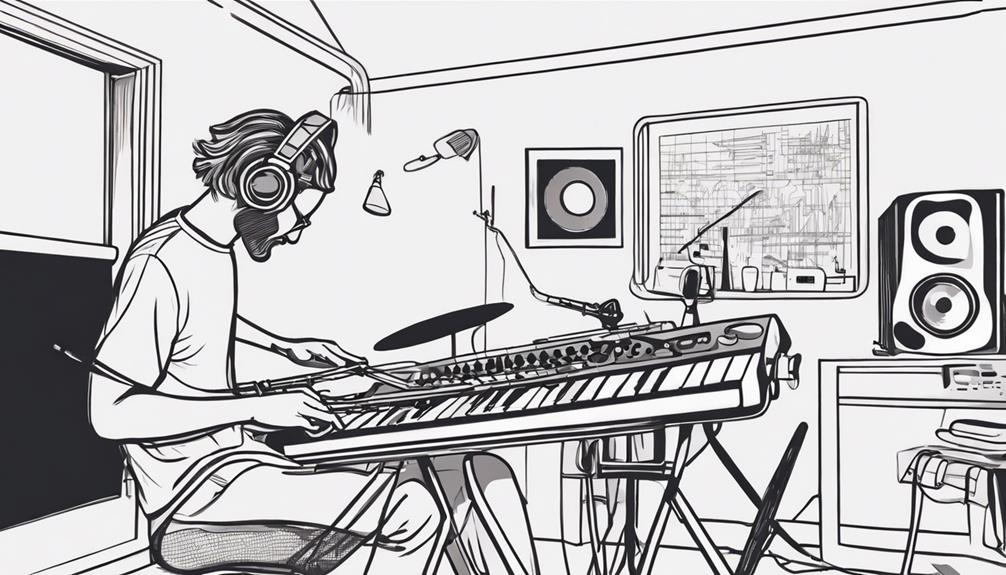
Prioritize quality over speed to guarantee meticulous attention to detail and polished results in music production. Rushing through the creative process can lead to overlooked mistakes and ultimately result in subpar outcomes. By taking the time to refine each aspect of your track, you can elevate its overall quality and secure a more professional and satisfying end product.
Patience and dedication to quality production not only demonstrate your commitment to excellence but also allow for a more thoughtful and intentional approach to music creation.
When you prioritize quality over speed, you give yourself the opportunity to examine thoroughly each element of your production, making sure that every sound, effect, and arrangement is precisely how you envision it. This focus on attention to detail is what sets apart amateur productions from professional ones.
Cultivate Creativity Through Experimentation
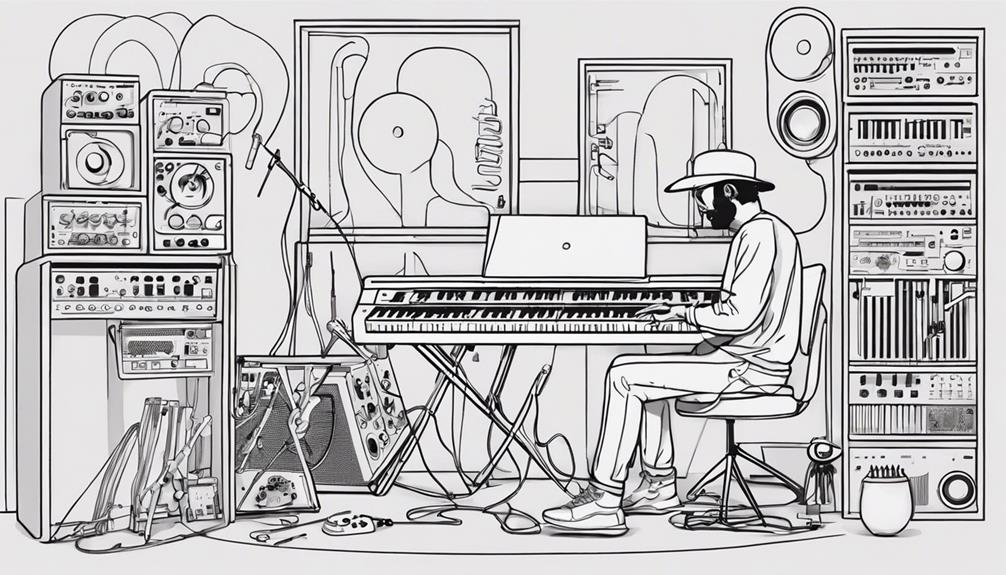
When aiming to enhance your music production skills, fostering creativity through experimentation is key. To expand your creative horizons, try experimenting with different genres, styles, and techniques.
Incorporating unconventional sounds, instruments, and effects into your music can add a unique touch that sets your productions apart. Challenge yourself to break out of creative ruts by exploring new production methods that you haven't tried before.
Embracing flexibility in your workflow will encourage creative exploration and innovation. Cultivate a mindset of curiosity and experimentation to consistently push the boundaries of your creativity in music production.
Optimize Workflow Efficiency
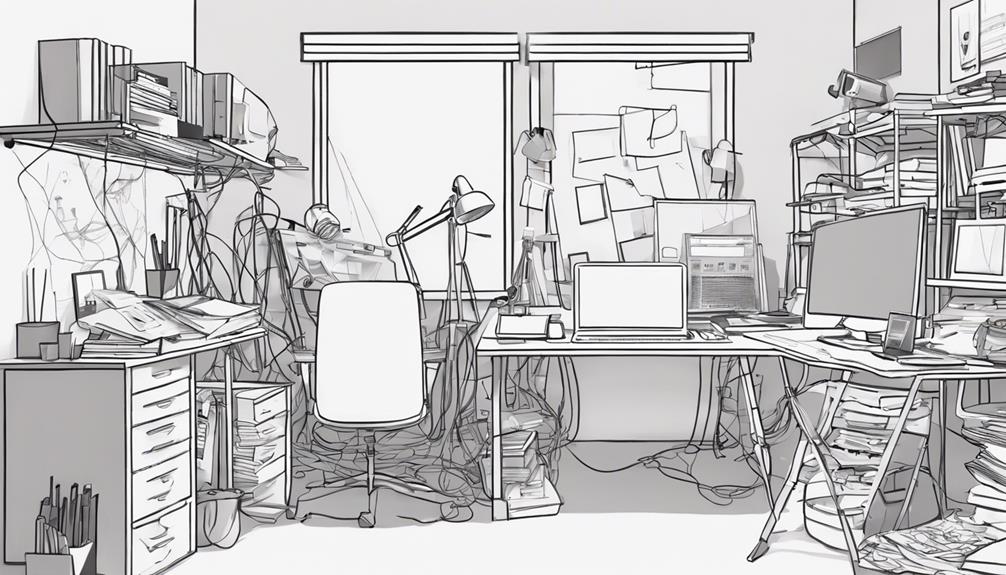
To optimize workflow efficiency in music production, incorporate time-saving strategies and organization techniques into your process. Utilize shortcuts and hotkeys in your DAW for faster navigation and increased productivity. Organize your project files systematically with proper labeling, color coding, and folder structures. Set up templates for common tasks to streamline your workflow and save time during production. Taking breaks is essential to prevent ear fatigue and maintain focus and clarity in your music production sessions. Additionally, having a structured plan and clear goals for each production session will help you stay on track and maximize efficiency.
| Tips for Optimizing Workflow Efficiency |
|---|
| Utilize shortcuts and hotkeys in your DAW |
| Organize project files with proper labeling and folder structures |
| Set up templates for common tasks |
Seek Diverse Learning Sources
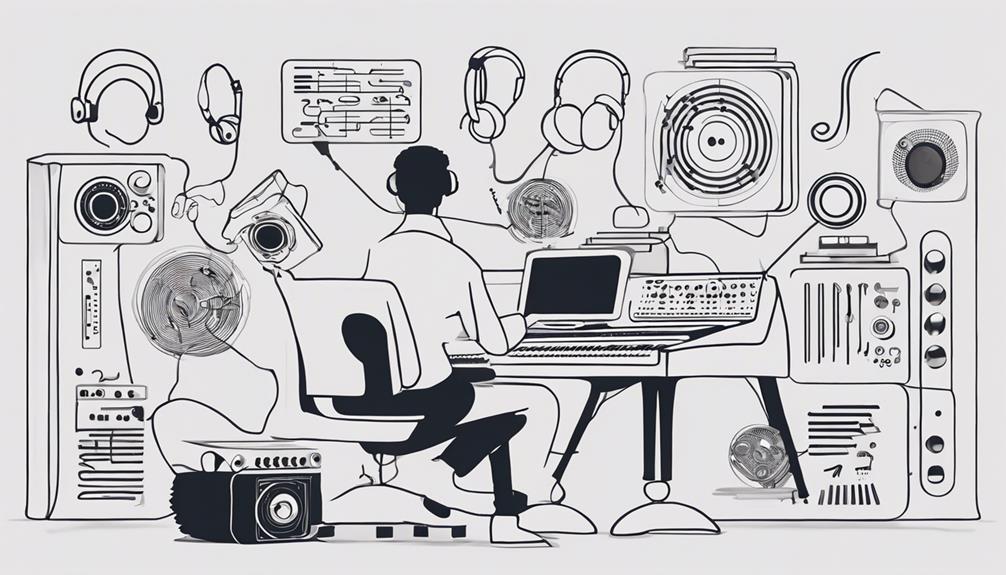
For a well-rounded understanding of music production, diversify your learning sources. Explore online tutorials, blogs, and courses to grasp various aspects of the music production process.
Join music production communities and forums to connect with peers and gain insights from different perspectives. Follow a diverse group of producers on social media platforms to stay updated on industry trends and learn new techniques.
Additionally, attending workshops, webinars, and conferences can provide valuable opportunities to learn from experienced professionals in the field. Engaging in collaborative projects with other producers is another effective way to exchange knowledge and enhance your skills.
Embrace Continuous Improvement
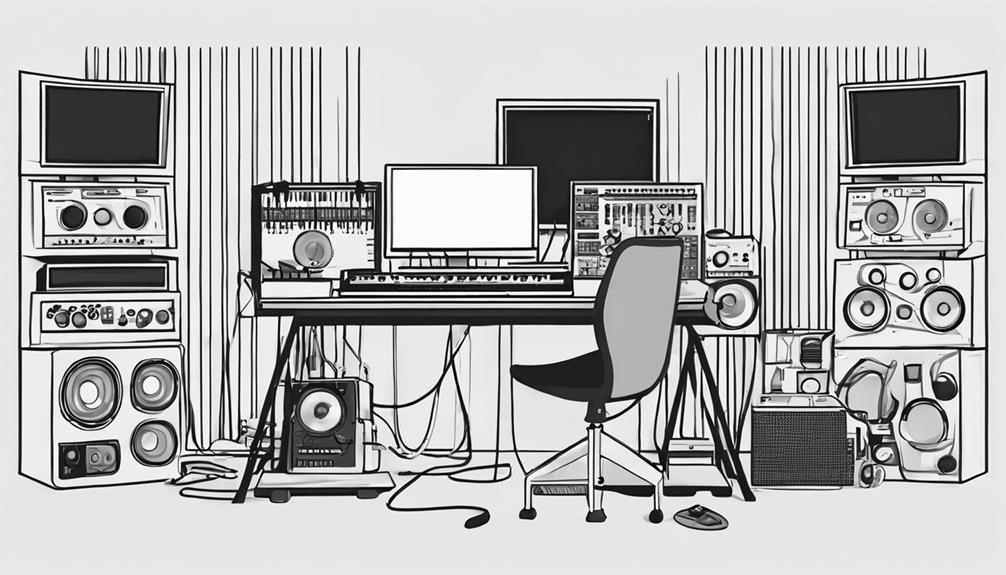
To truly excel in music production, you must embrace continuous improvement in your skills and knowledge. Becoming a better producer requires a commitment to regular practice, learning, and experimentation with new techniques.
Embrace feedback and constructive criticism as valuable tools to identify areas for growth and enhance your music production abilities. Stay informed about industry trends, technologies, and tools to evolve as a music producer continually.
Experimenting with various genres and styles can help expand your creative horizons and keep your sound fresh and innovative.
Setting goals and benchmarks is essential in tracking your progress and aiming for excellence in music production. By setting specific objectives, you can stay motivated and focused on honing your craft.
Frequently Asked Questions
How to Actually Get Better at Music Production?
To get better at music production, practice consistently, explore various genres/tools, seek feedback, set goals, and utilize online resources. These steps will help you improve your skills, stay updated, and expand your creative abilities over time. Additionally, collaborating with other producers and musicians can offer fresh perspectives and inspire new ideas. Don’t hesitate to experiment and step outside of your comfort zone, as this can lead to unique sounds and creative breakthroughs. By maintaining a curious and persistent mindset, you can continually improve your music production skills and develop your own distinct style.
How Do You Level up Your Music Production?
To level up your music production, dive deep into sound design, experiment fearlessly with arrangements, and fine-tune your mixing skills. Embrace feedback, stay curious about new techniques, and trust your creativity to soar.
How to Become a Good Music Producer?
To become a good music producer, immerse yourself in music theory, experiment with genres, practice consistently, seek feedback from mentors, and utilize online resources. These steps will help you hone your skills and develop a unique style.
How Long Does It Take to Get Better at Music Production?
Improving in music production is like climbing a mountain; it's different for everyone. You might progress quickly with dedication or take years to master complex skills. Consistent practice, feedback, and exploring new tools can speed up your journey.
Conclusion
So, keep practicing, experimenting, and learning to improve your music production skills.
Did you know that 60% of successful music producers spend at least 20 hours a week perfecting their craft?
With dedication and hard work, you too can reach your goals in music production.
Remember, the journey to mastery is a continuous process, so keep pushing yourself to grow and evolve as a producer.
Good luck on your musical journey!

